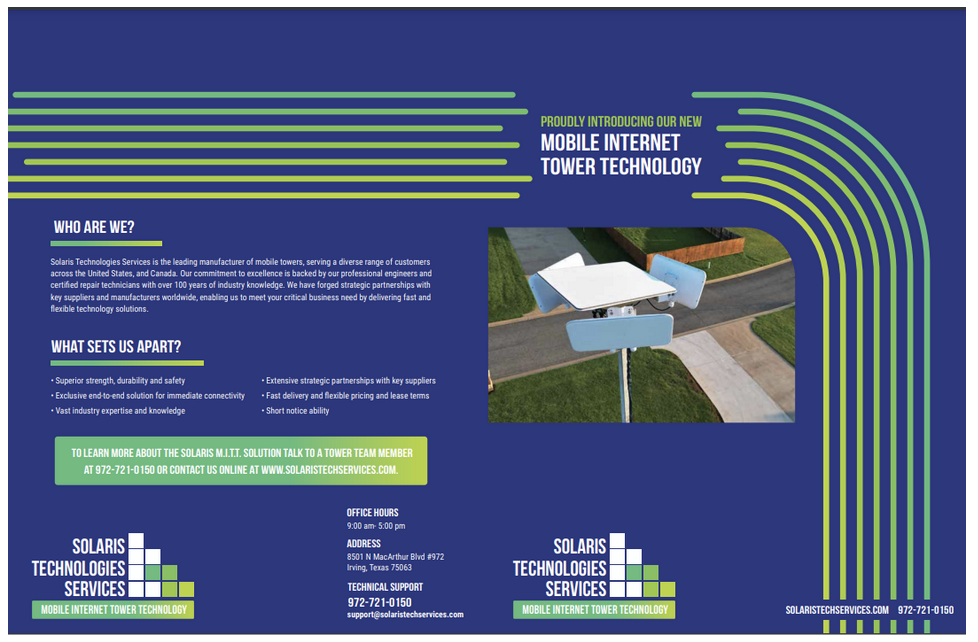 Evelyn Torres brings grit and passion to everything she does. When she sees something that needs to be done, she takes on the challenge and relishes it.
Evelyn Torres brings grit and passion to everything she does. When she sees something that needs to be done, she takes on the challenge and relishes it.
“I go for the hard things. My sole reason for being in this business is to make a difference. I don’t want to replicate anybody,” said Torres, who is the CEO of Solaris Technologies Services, a mobile tower manufacturer.
After 15 years with Nokia, where she served as head of the infrastructure division for Central America, Torres decided to go it alone, starting Solaris in Irving, Texas, in 2010. She resold telecom equipment from her garage. The business quickly grew and she invested in warehouse space and expanded the operations.
Nokia had created an entrepreneur out of Torres, assigning her challenging tasks, including one to expand the company into Guatemala. She opened the office, starting from scratch, hired staff and eventually succeeded in making the first Global System for Mobile Communications (GSM) call in all of Central America.
The Nokia experience also taught Torres the importance of carefully assembling the team at Solaris. “I didn’t do this on my own. I got the right people,” she said. Solaris currently has 30 full-time employees and about 20 contractors.
Today, Solaris occupies over 100,000 square feet across two warehouses; one in Irving and the other in Dallas. The company has experienced exponential growth every year of its existence, according to Torres. However, in 2017, it had to make major cutbacks when a company that owed them money went under. “We could have called it a day, but I decided to forge ahead. I have had my share of ups and downs and skinned knees,” Torres said.
The Need for Mobile Towers
After three years of selling telecom equipment with Solaris, Torres sensed a need in the marketplace for mobile towers. Networks were expanding rapidly in North America and Latin America, but the existing towers were aged and needed to be upgraded.
For one carrier, Solaris implemented mobile towers in more than 50 areas where it couldn’t justify building a permanent tower. “By deploying temporary towers, we were able to expand their networks to get them to nationwide coverage, implementing their vision quicker than they would have imagined,” Torres said.
Another demand for mobile towers has come from natural disasters, which have doubled in the last five years, according to Forbes. “We’ve been able to step up within 24 hours of these disasters and provide vital emergency preparedness solutions for many Americans across the United States,” Torres said.
Solaris also provides wireless coverage in unserved and underserved areas. Torres is passionate about providing mobile towers where there is a disparity in economics and, as a result, no wireless coverage.
During the COVID-19 pandemic, Solaris worked with two local ISPs and provided mobile WiFi capability to multiple Dallas school districts so students could participate in remote learning.
“It was a big eye opener that so few people had WiFi access,” she said. “We stepped up quickly to solve this issue, which other service providers had been talking about for months. It just wasn’t happening quick enough here in Dallas.”
The Differentiator
Torres knew from the beginning that she needed to develop patented technologies to set her company apart. Solaris designed its mobile tower and received patents.
What separates the Solaris mobile tower is an emphasis on safety, according to Torres. The company developed a patented triple-cable system, where each section of the tower is independently cabled with three cabling systems. “That’s the safest we can make it,” she said.
Another feature that stands out about the Solaris towers is that they are climb-rated, while most mobile towers have to be lowered to make changes to the equipment. “Sometimes, modifications need to be made on the tower equipment, but the tower services team doesn’t have the time to take the whole tower down,” Torres said.
Although Solaris’ towers are mobile, when in use, they use guy wires to stay in place. In fact, the cellular tower models are built to withstand EF3 tornadoes, with winds of 110 MPH.
Recently, the company announced the launch of the Solaris Event WiFi solution, also known as Mobile Internet Tower Technology (M.I.T.T.). It is designed to deliver immediate connectivity by combining low earth orbit satellites and cellular-based redundancy to offer high-speed internet access to customers anywhere.
Its line of products includes the 60-foot Mini Tower and the 82′ high-capacity towers. On-wheels products include the 106-foot Cellular-on-Wheels, 120-foot Cellular-on-Wheels, and 150-foot Goliath Cellular-on-Wheels. The company has a patent and received awards for innovation, quality and manufacturing.
Additional information about M.I.T.T. can be found in this brochure
Future Trends for Mobile Towers
Today, Solaris’ focus is to provide rapid deployment networks across the United States, Canada and Latin America. Torres takes an aggressive stance on running her company and is ready to take advantage of new opportunities.
“As a small business, we are very agile. We can move on a dime,” she said. “To be successful, we have to be able to make decisions quickly based on whether something is within our core competency.”
In the next five years, Solaris is also targeting the rural broadband market as money is spent through the infrastructure bill. Torres believes mobile towers provide a viable solution for rural broadband in terms of cost and ease of deployment.
But, mostly, she believes mobile towers can help the United States in its effort to quickly close the digital divide. When it comes to solving problems, patience is not her strong suit.
“Let’s just get something moving today,” Torres said. “If we find that the infrastructure of this country is lacking, then we should not be talking. We should be doing.”
For more information, call Solaris’ MITT team at: 972-721-0150.
By J. Sharpe Smith, Inside Towers Technology Editor





Reader Interactions